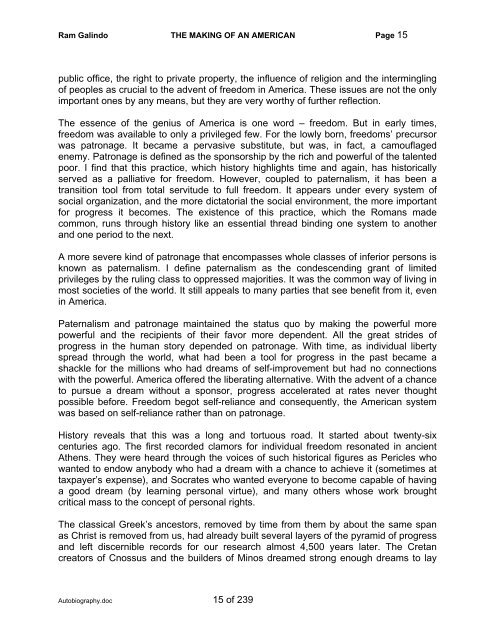Autobiography - The Galindo Group
Autobiography - The Galindo Group
Autobiography - The Galindo Group
You also want an ePaper? Increase the reach of your titles
YUMPU automatically turns print PDFs into web optimized ePapers that Google loves.
Ram <strong>Galindo</strong> THE MAKING OF AN AMERICAN Page 15<br />
public office, the right to private property, the influence of religion and the intermingling<br />
of peoples as crucial to the advent of freedom in America. <strong>The</strong>se issues are not the only<br />
important ones by any means, but they are very worthy of further reflection.<br />
<strong>The</strong> essence of the genius of America is one word – freedom. But in early times,<br />
freedom was available to only a privileged few. For the lowly born, freedoms’ precursor<br />
was patronage. It became a pervasive substitute, but was, in fact, a camouflaged<br />
enemy. Patronage is defined as the sponsorship by the rich and powerful of the talented<br />
poor. I find that this practice, which history highlights time and again, has historically<br />
served as a palliative for freedom. However, coupled to paternalism, it has been a<br />
transition tool from total servitude to full freedom. It appears under every system of<br />
social organization, and the more dictatorial the social environment, the more important<br />
for progress it becomes. <strong>The</strong> existence of this practice, which the Romans made<br />
common, runs through history like an essential thread binding one system to another<br />
and one period to the next.<br />
A more severe kind of patronage that encompasses whole classes of inferior persons is<br />
known as paternalism. I define paternalism as the condescending grant of limited<br />
privileges by the ruling class to oppressed majorities. It was the common way of living in<br />
most societies of the world. It still appeals to many parties that see benefit from it, even<br />
in America.<br />
Paternalism and patronage maintained the status quo by making the powerful more<br />
powerful and the recipients of their favor more dependent. All the great strides of<br />
progress in the human story depended on patronage. With time, as individual liberty<br />
spread through the world, what had been a tool for progress in the past became a<br />
shackle for the millions who had dreams of self-improvement but had no connections<br />
with the powerful. America offered the liberating alternative. With the advent of a chance<br />
to pursue a dream without a sponsor, progress accelerated at rates never thought<br />
possible before. Freedom begot self-reliance and consequently, the American system<br />
was based on self-reliance rather than on patronage.<br />
History reveals that this was a long and tortuous road. It started about twenty-six<br />
centuries ago. <strong>The</strong> first recorded clamors for individual freedom resonated in ancient<br />
Athens. <strong>The</strong>y were heard through the voices of such historical figures as Pericles who<br />
wanted to endow anybody who had a dream with a chance to achieve it (sometimes at<br />
taxpayer’s expense), and Socrates who wanted everyone to become capable of having<br />
a good dream (by learning personal virtue), and many others whose work brought<br />
critical mass to the concept of personal rights.<br />
<strong>The</strong> classical Greek’s ancestors, removed by time from them by about the same span<br />
as Christ is removed from us, had already built several layers of the pyramid of progress<br />
and left discernible records for our research almost 4,500 years later. <strong>The</strong> Cretan<br />
creators of Cnossus and the builders of Minos dreamed strong enough dreams to lay<br />
<strong>Autobiography</strong>.doc 15 of 239


